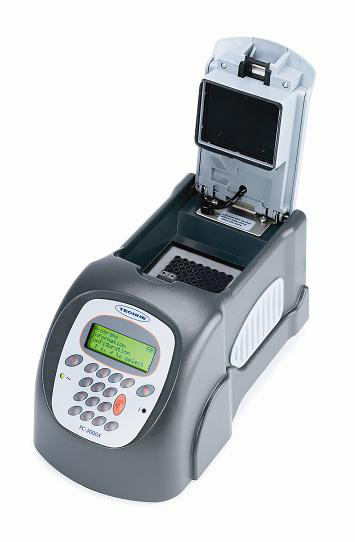Thermal cyclers also known as PCR machines are very commonly used in almost all modern molecular biology and cell biology labs. Thermal cyclers change the temperature of the sample at precise intervals and duration to amplify the small genetic material by PCR. The rapid regulation of temperature has to be very precise and consistent to get good amplification. Thermal cyclers are also used in diagnostic labs and in forensic laboratories to solve crime by identifying and matching the genetic material obtained from the crime scene to the suspect.
If your need is to run only few samples a week and not in a regular intervals, a smaller less expensive personal thermal cycler will meet your needs. In todays market a number of them are available with lower price tag and smaller in size. Because of their small footprint, they will sit on the lab bench without taking up any space. Some models are small enough to transport for field use. Smaller units don’t mean they are of lesser quality. Some of the smaller units even have faster ramp time and can finish the run faster than come of the larger instruments.
If you run dozens of samples regularly you may want to invest in a unit with high throughput capacity. Some of the thermal cyclers can run 96 samples at a time or even 384 samples at a time. The larger the number of samples usually the volume of the reaction also is smaller. Some of these models can be networked together and controlled by one instrument.
Heating Block
Heating blocks used in the thermal cyclers come in different configurations, and different tube capacity. Most commonly used tube size is 0.5 ml tube, or o.2 ml tubes, strips, or PCR plates. PCR plates are mostly for 96 well formats for 0.2 ml volume. Some models you can run only certain size tubes only. Others offer interchangeable blocks. If you anticipate using different types of tubes, it may be better to invest in an interchangeable heating block.
Thermal Gradient
Some of the programmable systems allows for simple gradient across the block. This is very useful for finding optimal PCR conditions. Simple optimization only requires simple gradient across the heat block, each row in the heat block ramps up to different temperature. Some instruments allow different ramp rate and temperature in different zones in the block. This will allow to run different experiments at the same time. If this is a requirement, check with the instrument company if it is possible with their models.
Ramp Rate
Each instrument is designed with varying ramp rate, how fast the heating block can get to the selected high temperature. The faster the ramp rate the faster the cycles and run time. A faster ramp time is a good feature. To make this happen the heating block is designed with thermo conductive metals. A ramp rate of 5 degree C or 6degree C per second is considered good.
Specialized Lids
When working in smaller volume tubes evaporation and condensation is an issue. Condensation and evaporation can affect negatively the reaction results because it affects the sample volume and the reagent ratio necessary. Lids can eliminate evaporation with very good sealing mechanism. Tubes on the outer edge will have the most variation because of this problem.
Value
Recently a number of inexpensive thermal cyclers are available in the market. In a race to make the instrument cheaper, quality and precision are sacrificed. Many of these units are made with cheaper components, and may run into technical problems soon after they are purchased. So it is very important not to consider cost as the only consideration. If the cheap instrument breaks down, you will have to replace it or get it fixed which will cost more and your research will be affected. It is important to find out the warranty comes with the instrument. Better built instruments will offer a longer warranty which gives piece of mind to the buyer.

